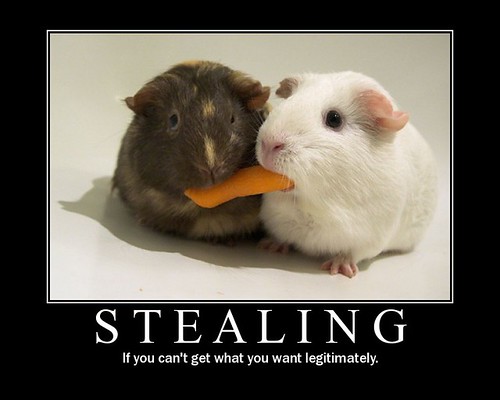
What cute hamsters!
But that one little guy is trying to steal his friends' carrot, and that is not cool. He did not come by that carrot in a legitimate fashion, and he is is attempting to benefit himself from his furry friends' hard work. That is unjust, dishonest, and basically really mean. He who does the work should reap the benefits.
In other words, "get your own carrot, I worked hard for this one".
What does this have to do with turnitin.com? Lots. Our classroom discussion on the cons that apply to using this assignment analyzing system really made me think about the experiences I have had with this system, and I can't say there are many positive points to look back on.
First, to explain what turnitin does (as if any of you don't know), the system analyzes students’ papers and generates a digital fingerprint of the words and patterns used in them. It then checks the fingerprint against a massive database of written submitted work, including millions of academic papers and articles in trade journals, newspapers and other subscription-based publications. What this is meant to ensure is that no-one is submitting assignments that have stolen ideas from other sources to claim them as their own.
In theory, this all sounds like a great idea. It's a system that makes it almost painfully easy for profs to catch plagiarism. However, it is evident that this system is not without it's faults. All papers submitted to the website remain there in 'storage', and many students have understandable issues with the fact that their work can be archived on a website. Maybe we would like to have sole rights to our unpublished amateur work? Not a big demand, really.
What my main problem though is that I don't see a feasible way, in an assignment, to completely avoid having material similar to someone else's. In some classes, a final assignment may have only 4 topic options for a class of nearly 300. There are seriously only a small variety of ways that information can be put down on paper. It is ridiculously easy to have a paper that may look similar to anothers even though you have have never met each other or even spoken.
As well, there are some bits of information that I have picked up over the years that have become part of my basic knowledge. I can't tell you where I learned it from or when, but I damn well know it. What do I do then, when I want to use this information in an assignment and I can't find the source? I'm not plagiarising, but at some point this information has become MINE. I know it, it's my info. This is clearly not plagiarism, but turnitin's non-human digital system is not equipped to make such distinctions. It will simply compare, and flag non sourced material.
I have personally been the victim of an unfair and altogether wrong plagiarism charge from the use of turnitin, and I cannot even begin to tell you how frusterating it is to sit there and wave a pile of rough notes and sources in front of a Prof attempting to demonstrate how I arrived at my paper in my own words and through my own research, only to have her say she was sorry, but turnitin says otherwise.
I did NOT steal the carrot.
Anyone have any similar stories?


No comments:
Post a Comment